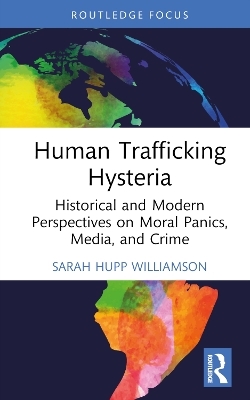
Human Trafficking Hysteria
Historical and Modern Perspectives on Moral Panics, Media, and Crime
Seiten
2025
Routledge (Verlag)
978-1-032-57356-4 (ISBN)
Routledge (Verlag)
978-1-032-57356-4 (ISBN)
- Lieferbar (Termin unbekannt)
- Versandkostenfrei
- Auch auf Rechnung
- Artikel merken
The text examines the impacts of human trafficking panics perpetuated by media, including understanding the origins of human trafficking in the nineteenth century white slave panic, the ways that popular media perpetuates stereotypes, the reality of trafficking at sporting events, and the role of social media in generating misinformation.
Through cultural criminology, this book brings together existing research to provide an overview of historical and modern moral panics related to human trafficking.
What do you picture when you hear the words human trafficking? Perhaps you imagine someone kidnapped and sold as shown in films or worry that sex trafficking increasingly occurs online or in big cities during major events. While sex trafficking does occur, the reality of human trafficking is complex, though this reality is often obscured by the media. The media has played a large role in shaping understanding of this crime, with panics, conspiracies, and misinformation abounding. This book uses cultural criminology to break down historical and modern panics to understand the links between media portrayals of human trafficking, perpetuation of stereotypes, and influences on policy. The text examines the impacts of human trafficking panics perpetuated by media, including understanding the origins of human trafficking in the nineteenth-century White slave panic, the ways that popular media perpetuates stereotypes, the reality of trafficking at sporting events, and the role of social media in generating misinformation.
Human Trafficking Hysteria is a valuable resource for criminology and sociology classes, as well as special-topics classes on sex crimes, victimization, or the media.
Through cultural criminology, this book brings together existing research to provide an overview of historical and modern moral panics related to human trafficking.
What do you picture when you hear the words human trafficking? Perhaps you imagine someone kidnapped and sold as shown in films or worry that sex trafficking increasingly occurs online or in big cities during major events. While sex trafficking does occur, the reality of human trafficking is complex, though this reality is often obscured by the media. The media has played a large role in shaping understanding of this crime, with panics, conspiracies, and misinformation abounding. This book uses cultural criminology to break down historical and modern panics to understand the links between media portrayals of human trafficking, perpetuation of stereotypes, and influences on policy. The text examines the impacts of human trafficking panics perpetuated by media, including understanding the origins of human trafficking in the nineteenth-century White slave panic, the ways that popular media perpetuates stereotypes, the reality of trafficking at sporting events, and the role of social media in generating misinformation.
Human Trafficking Hysteria is a valuable resource for criminology and sociology classes, as well as special-topics classes on sex crimes, victimization, or the media.
Sarah Hupp Williamson is an Associate Professor of Criminology at the University of West Georgia. Her several lines of research examine the intersections of globalization, inequality, and crime. She is the author of Human Trafficking in the Era of Global Migration: Unraveling the Impact of Neoliberal Economic Policy and Criminology Explains Human Trafficking.
1. INTRODUCTION TO HUMAN TRAFFICKING 2. CULTURAL CRIMINOLOGY AND MORAL PANIC THEORY 3. THE WHITE SLAVE PANIC 4. THE POP CULTURE PANIC 5. THE SPORTING EVENT PANIC 6. THE SOCIAL MEDIA PANIC 7. CONCLUSION
| Erscheinungsdatum | 04.01.2025 |
|---|---|
| Reihe/Serie | Routledge Studies in Crime, Culture and Media |
| Verlagsort | London |
| Sprache | englisch |
| Maße | 138 x 216 mm |
| Themenwelt | Geisteswissenschaften ► Geschichte |
| Recht / Steuern ► Strafrecht ► Kriminologie | |
| Sozialwissenschaften ► Kommunikation / Medien ► Medienwissenschaft | |
| Sozialwissenschaften ► Soziologie | |
| ISBN-10 | 1-032-57356-2 / 1032573562 |
| ISBN-13 | 978-1-032-57356-4 / 9781032573564 |
| Zustand | Neuware |
| Informationen gemäß Produktsicherheitsverordnung (GPSR) | |
| Haben Sie eine Frage zum Produkt? |
Mehr entdecken
aus dem Bereich
aus dem Bereich
klare Antworten aus erster Hand
Buch | Softcover (2023)
UTB (Verlag)
CHF 27,85


